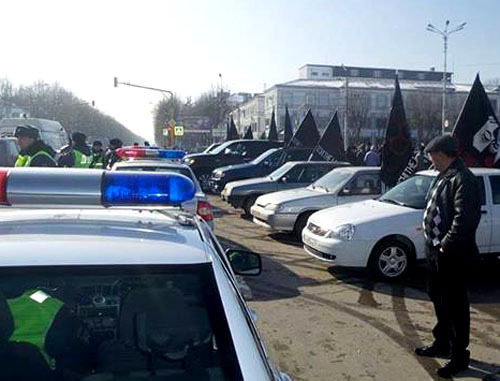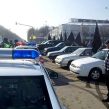
Sochi Olympics Protested in Kabardino-Balkaria and Karachaevo-Cherkessia
Publication: Eurasia Daily Monitor Volume: 11 Issue: 26
By:

On February 7, as the Winter Olympics were opening in Sochi, police in Nalchik, Kabardino-Balkaria, violently dispersed a peaceful protest by Circassian activists. Thirty-seven protesters in the republic’s capital were arrested, their flags and banners, some reading “Sochi Is the Land of Genocide,” were confiscated. According to Circassian activist Aslan Beshto, a majority of the protesters were young people under 30 who self-organized via Facebook. One day before the start of the Olympics, the Facebook group announced that the protest would take place in the central part of Nalchik at around noon. The protesters managed to line up their cars with green Circassian flags bearing crossed arrows and posters, but the police soon cracked down on them, despite the fact that the gathering was peaceful (https://www.kavkaz-uzel.ru/articles/237828/). Still, some of the video recordings of the protesters were posted online before the police crackdown (https://bambuser.com/v/4339065).
Hundreds of drivers reportedly protested against the Olympics in Karachaevo-Cherkessia. Unconfirmed reports suggested that one of the protesters suffered injuries while being arrested. Four people reportedly were arrested in Sochi for waving Circassian flags. Police stations were heavily fortified on the opening day of the Olympics in Nalchik and numerous police patrols were visible across Circassian towns, with four to five police cars per block (https://twitter.com/fatimatlis). As this article was being prepared, a majority of those detained had been released, but six persons still remained in custody. Law enforcement personnel reportedly tortured and beat up those in custody. Interrogators asked the detainees about their opposition to the Olympics in Sochi, as well as their political and religious attitudes (https://www.kavkaz-uzel.ru/articles/237908).
Circassians are opposed to the Winter Olympic Games in Sochi because they consider it the site of a “genocide” committed against their forbears. One-hundred-and-fifty years ago, the Russian Empire completed the expulsion of a majority of the Circassian population from the North Caucasus. Moscow employed scorched earth tactics in and around Sochi, summarily killing Circassians, starving them to death through plundering their food supplies, and eventually forcing them to flee their homeland. Russian accounts from the time documented the Russian army’s tactics accurately and in detail. Historical evidence also suggests that Tsar Alexander II, who finally defeated the Circassians in 1864, actually intended to clear the area of all Circassians (https://www.aheku.org/articles/russian/hist/5067).
Yet, contemporary nationalist and Putinist Russia denies the “genocide” charges or shrugs them off as the common practice of all governments of that time. Russian officials forget that the European powers which engaged in similar practices in their colonies eventually withdrew from them and are apologetic about that past now.
On February 1, an estimated 1,200 people protested the Sochi Olympics near the Russian Embassy in Ankara, Turkey, under the slogan “Circassians Extinguish the Olympic Flame.” The closer Circassians live to the Olympic sites, the more cautious they have been in expressing their opinions. Ruslan Gvashev, the head of the Circassian Elders’ Council in Krasnodar region, where Sochi is located, told the Kavkazsky Uzel website: “Despite the fact that I am against public protests against the Olympiad, I understand those Circassians who openly boycott the Olympic Games. Our President Vladimir Putin visited Sochi and when he spoke of the symbolic meaning of the fire in the Caucasus, he did not mention the word Adyg or Circassian even once. They are hiding away the truth about the history of the Circassian people” (https://www.kavkaz-uzel.ru/articles/237568/).
Even most loyal Circassian leaders were outraged at the fact that the Russian government excluded any mention of the Circassians during the opening ceremony of the Olympics. The government did that despite previous multiple promises that the Circassian cultural component would be present during the Olympics (https://www.kavkaz-uzel.ru/articles/237908/). The trick played on the Circassians once again highlighted the character of the contemporary Russian state, which increasingly resembles a rogue state, especially when the Russian government feels it will not be held accountable. After the mass arrests of peaceful protesters in Nalchik, it is quite understandable why Circassians who live near Sochi prefer to be quite reticent about their true opinions.
Russian policy toward the Circassian issue has been marked by silence, denial, pressure and misrepresentation. The Russian government organized the arrival of a group of friendly Circassians from abroad to represent those Circassians who are happy with the Olympics. On February 5–6, several dozen Circassians from Syria, the United Arab Emirates (UAE), Palestine, Israel, Turkey and Germany arrived in Sochi at the invitation of the Russian government. All of the visitors are alumni of Kabardino-Balkarian State University in Nalchik. Last October, a delegation of Circassians from abroad was taken to Sochi and Russian media reported that they supported the Olympics, while the visitors said they were tricked. Circassian organizations and activists stated that any Circassian visitors to Sochi represent no one but themselves. “Russia, which could not receive the support of even one of the Circassian diaspora organizations, represented the students and the alumni of Kabardino-Balkarian State University and their parents as representatives of the Circassian diaspora, trying to misinform world public opinion,” read a statement of the Circassian organization the Patriots of Circassia (https://www.kavkaz-uzel.ru/articles/237791/). “None of the Circassians from Israel went to the Olympiad in Sochi,” read a statement posted on the Internet by Israeli Circassians. “Those who they say are [Israeli] Circassians at the Olympics are in fact Arabs from Palestine” (https://www.golos-ameriki.ru/content/nalchik-protests-and-arrests/1846992.html).
The Russian government’s crackdown on Circassian activists in the North Caucasus, and clever PR actions, show the character of the current political regime in Moscow. The Russian government is frightened of peaceful protesters, avoids dialogue with its opponents and not even a high-profile international event like the Olympiad precludes it from using repressive and rogue practices. Oppression, however, may come at a price for Moscow, because the Circassians may start to dissociate themselves from the Russian Federation. That will pose another potential separatist threat to the North Caucasus the longer Moscow continues to ignore their claims.




